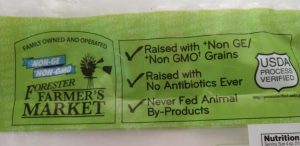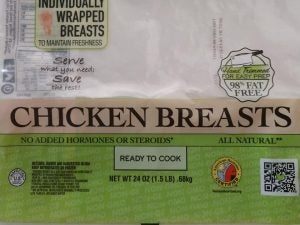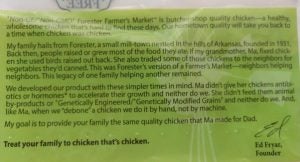I live in a super tiny town, about 1,000 people with no stoplight in the whole county. I’m 89 miles away from the closest Starbucks and pretty limited on what to purchase when it comes to food. Therefore, it may sound silly to the average city person, but I usually buy chicken breast at the gas station. Our grocery store carries only an off brand that doesn’t usually taste the best.
But I may have to start buying that grocery off brand since the kind carried at the gas station recently switched their labeling, marketing, and packaging to bombard consumers with misleading claims that I just can’t support and won’t purchase. Let’s break them down one by one, shall we?
1: Non-GMO. GMO or GE grains allow farmers to be more sustainable by growing more crop on less land while using less pesticides, tillage, etc. Furthermore, everything we eat has been modified in some way, so the term “GMO” is somewhat scientifically meaningless. GMOs do great things for farmers and the planet though, so this is just a marketing ploy used to mislead and sell a product which is generally worse for the earth.

2: Raised with no antibiotics ever. OK, that’s admirable and commonplace nowadays. However, antibiotics can play a very important role in animal health and shouldn’t really be demonized. Would you withhold medicine from a sick pet or child? No, and we shouldn’t be cruel to livestock either. Also, if antibiotics are used, the animal must go through a withdrawal period before they can legally go to market, so all meat is actually antibiotic free.
3: Never fed animal by-products. Chickens are not vegetarian by nature (they are omnivoires). They’ll eat anything that crosses their path, and a majority of livestock receive a grass- or grain-fed diet regardless, so this is pretty much a moot point.
4: Family owned and operated. Well, 99 percent of farms in the U.S. are family owned so … again, a moot point.

5: Individually wrapped breasts. I could see why some people would appreciate this, however, it’s much more wasteful. The company now uses way more plastic. The packaging is much bigger, you get less product, and the price went up. For what?
6: No added hormones or steroids. If you read the asterisks and fine print, it says right on the package: “Federal law strictly prohibits the use of hormones or steroids in poultry. It does not exist, so again, this is just a meaningless marketing tactic trying to sell you a higher-priced product.
7: American Humane Certified. I’m actually pretty familiar with their standards, and they’re good ones. There are many third-party certification programs out there but overall, all livestock farmers care about their flocks/herds. The better animals are treated, the more money the farmer makes. So treating them humanely is pretty industry standard.
8: All natural. From a legal and regulatory standpoint, this marketing term really has no meaning or oversight, but it sounds good I guess?

9: This paragraph. Healthy, wholesome chicken is hard to find? Treat your family to chicken that’s chicken? What does that even mean? By the way, growth promoting antibiotics aren’t really even allowed anymore in livestock production per FDA regulations, and again, hormones are not a thing. This tries to send a romantic image, which is fine in a way because who doesn’t love homegrown “backyard” type chickens? I’m sure that’s not how these chickens are raised though … they’re raised in typical modern poultry buildings like any other commercial chicken farm, which is fine. This whole paragraph is pretty misleading though. Regardless, let’s take a moment to have a chuckle at the fact that the founder of this chicken company’s name is Ed Fryar? Ha, get it? Fried chicken? Ed Fryar? I’m here all night, folks …
Anyway, it’s a shame that I will no longer by this brand of chicken, because I do think it’s tasty. If only they focused on quality, price, flavor, etc. as opposed to inflammatory language. I’ll buy the other brands at the grocery store in the neighboring towns, or at the grocery store in my town, which is actually a grocery store/Subway/gas station/movie rental place/deli/liquor store in one. (If you live in a tiny farm town like this you understand!) I do hope more food companies take note that lying or using misleading language is not the way to sell a product. Consumers are not as dumb as they think and shouldn’t be treated as such.
Michelle Miller, the Farm Babe, is an Iowa-based farmer, public speaker, and writer, who lives and works with her boyfriend on their farm, which consists of row crops, beef cattle, and sheep. She believes education is key in bridging the gap between farmers and consumers.



